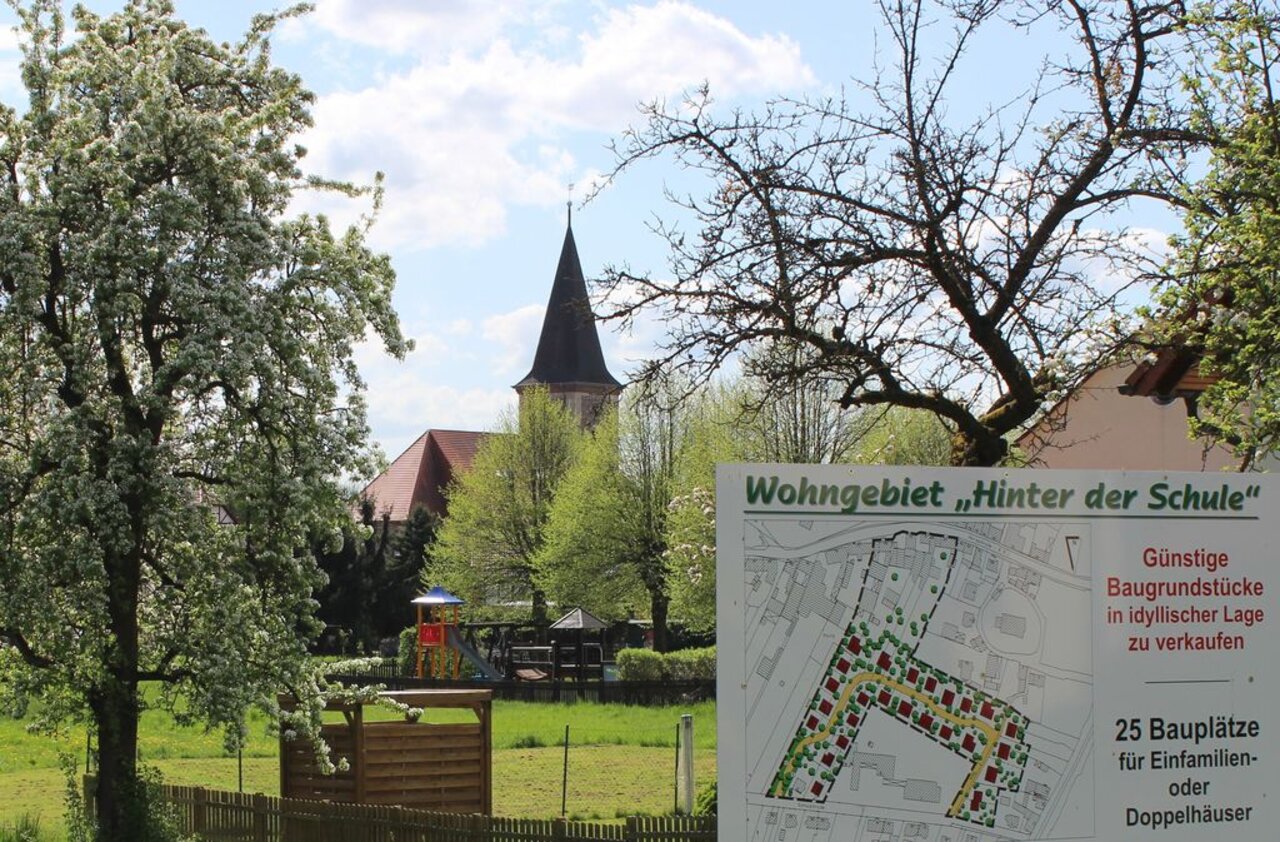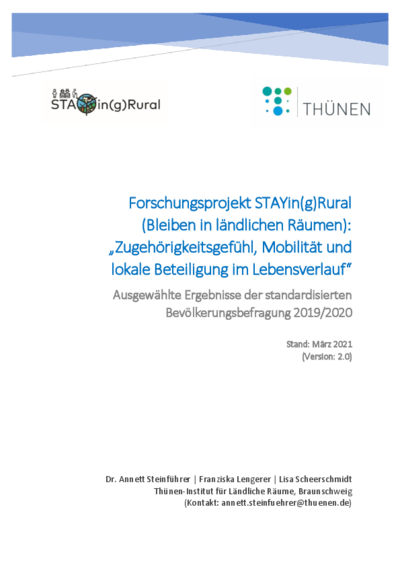Project
Staying in the Rural: Contemporary Life Course related Senses of Belonging, Mobility and Rural Community Participation

Staying in the Rural
Staying in rural (and non-rural) areas is connected to deliberate decisions, which are renegotiated over the life course. The project aims to highlight the motives of those who stay, as they are often neglected in studies on rural areas.
Background and Objective
Population geography research has mainly focused on in- and out-migration and related decisions, motives and consequences for individuals and affected spaces. Especially in rural areas, those who do not move are seen as a residual category and their motivations for staying receive limited academic or policy attention.
STAYin(g)Rural investigates why and how people stay in rural areas at different stages of their lives. The focus lies on three life course stages that are known triggers for the re-negotiation of the decision to stay or to leave: 1) the period of young adulthood, commencing employment or further education 2) the period of union and family formation 3) the period following the transition to retirement. For all three life course stages we acknowledge that people elect to (selectively) belong to and participate in rural areas and that different types of mobilities influence their staying processes.
We are especially interested in:
- staying processes in rural areas in different life course stages
- relations between belonging, staying processes and active contribution to community life
- the question of how staying is individually enabled and performed in different geographical contexts - more precisely in three regions with a history of depopulation
Approach
Our research interest requires the integration of different methods. Empirically, we examine three European case study regions: East Groningen in the Netherlands, South Tyrone in Northern Ireland and the region Südharz in the administrative district Göttingen in Germany. All three regions are considered to be secluded and peripheral in their national contexts and traditionally exhibit tendencies of population decline and especially the out-migration of youth. The focus of the research in Germany lies on villages comprising less than 2.000 inhabitants. In the Netherlands and in Northern Ireland we additionally take dispersed settlements into account.
During the project, the results will continuously be discussed with actors from rural areas and further developed in cooperation with them. To this end, National Steering Groups with representatives of different interest groups and specific community and life course stage representatives were set up in each country.
Data and Methods
The following empirical investigations have already been conducted:
- Winter 2019/2020: a standardised questionnaire in eleven villages (with 1,106 respondents)
- Spring/Summer 2021: semi-structured interviews (15 for each life course stage of interest)
Additionally planned:
- Spring/Summer 2022: focus group discussions with respondents in different life course stages
The Thünen Institute of Rural Studies is responsible for the case study Südharz (district Göttingen, Lower Saxony, Germany) as well as for the life course stage of retirement.
Our Research Questions
- Which stayer types and staying processes can be identified at different life course stages, for different generations and in different rural geographical contexts?
- What are the roles of different types of belonging, rootedness, and peer and family influences in the processes of rural staying? To what extent can ‘cultures of staying’ be identified?
- How do daily life mobilities (e.g. commuting), virtual mobilities (e.g. social media) and (reverse) place elasticity (e.g. connections with leavers and other places) enable staying?
- How do stayers participate in and contribute to social community life? How does this relate to their s/elective ways of belonging to the rural region and their social networks?
Results
The findings of the research project STAYin(g)Rural promise a changed perspective on rural areas: Through the eyes of those who stay, subjectively perceived opportunities, problems and meanings of places can be understood as well as their interconnectedness with processes of staying.
Download (overview of first descriptive results; in German)

Please find an overview of first descriptive results based on the survey conducted in winter 2019/2020 to download here.
pdf document; (limited accessibility, in German) 982 KB
(© Thünen-Institut/Annett Steinführer, Franziska Lengerer, Lisa Scheerschmidt)
Thünen-Contact

Involved Thünen-Partners
Involved external Thünen-Partners
-
University of Groningen
(Groningen, Niederlande) - Queen's University Belfast
(Belfast, Großbritannien (inkl. Nordirland))
Funding Body
-
Deutsche Forschungsgemeinschaft (DFG)
(national, öffentlich)
Duration
5.2019 - 12.2023
More Information
Project status:
finished
Publications to the project
- 0
Lengerer F (2025) Local community participation of older village residents : social differences and the role of expectations. J Rural Studies 115:103591, DOI:10.1016/j.jrurstud.2025.103591
- 1
Ferguson S, Haartsen T, Steinführer A, Catney G (2024) The role of non-resident family ties in rural staying. Popul Space Place 30(3):e2708, DOI:10.1002/psp.2708
- 2
Steinführer A (2023) Bleiben, wenn alle gehen? Von Verbundenheiten, Bindungen - und zwei Mittelgebirgen. BAB Report 006:63-69
- 3
Lengerer F, Haartsen T, Steinführer A (2023) Exploring justice in the process of redesigning local development strategies for LEADER: Representation, distribution, and recognition. World 4(1): 56-79, DOI:10.3390/world4010005
- 4
Lengerer F, Steinführer A, Haartsen T (2022) To participate, or not to participate - That is the question. (Non-)participation of older residents in rural communities. J Rural Studies 91:47-57, DOI:10.1016/j.jrurstud.2022.02.008
- 5
Lengerer F, Steinführer A (2021) Bleiben im Dorf : Eine Fallstudie zu einem wenig beachteten Thema. Planerin(3):11-13
- 6
Steinführer A, Lengerer F (2020) Von Menschen, die bleiben. Stadtbauwelt 227:42-47

![[Translate to English:] [Translate to English:]](/media/_processed_/2/0/csm_LV_Bei_Hornburg_Quelle_Johanna_Fick_neu_da89674833.jpg)
![[Translate to English:] [Translate to English:]](/media/_processed_/2/0/csm_LV_Bei_Hornburg_Quelle_Johanna_Fick_neu_3aae309567.jpg)





